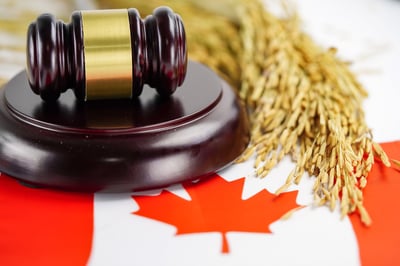Quick guide to getting a Canadian food import licence
Canadian businesses import billions of dollars in food products annually, including more than 75% of the country’s fresh fruits and vegetables. It’s a vast market opportunity.
Companies that import food must comply with Canada’s food import safety regulations, which are stricter than the rules for locally produced food. Before you can legally import food products, you need to apply for a Safe Food for Canadians (SFC) licence and comply with other regulatory requirements, such as traceability and preventive controls.
What types of businesses need an SFC licence?
According to the Canadian Food Inspection Agency (CFIA), companies engaged in the following activities must obtain a SFC licence:
- importing food or food products;
- manufacturing, processing, treating, preserving, grading, packaging, or labelling food for export, or for transportation across provincial or territorial borders;
- exporting food, where an export certificate is requested;
- slaughtering food animals from which meat products are derived for export or to be sent across provincial or territorial borders;
- storing and handling a meat product in its imported condition for inspection by CFIA.
Canadian food import licences aren’t available at Canada Border Services Agency (CBSA) ports of entry and must be obtained in advance of importation. If you’re unsure whether your business requires a licence, the CFIA provides an interactive tool to help find an answer.
How to apply for a Safe Food for Canadians licence
After confirming that you require an import licence, you can turn your attention to the process of applying for a SFC licence. Before you begin, make sure you have a valid business number and have registered with the CFIA. In brief, the SFC licence application involves the following steps.
1. Gather the necessary information.Some of the information required for the application includes:
- business name and contact information;
- list of food products you plan to import;
- information about the food products, including brand name, quantity, and net weight;
- details of the storage and transportation of the food products;
- details of the food safety plan.
The application form for a Safe Food for Canadians licence is available on the CFIA website. You can fill out the form online or print a paper document to complete by hand.
3. Submit the application and pay the fee.Submit the completed application form and the required fee to the CFIA. Fees can vary from one importer to another, depending on the food products being imported.
4. Await approvalAfter submitting your application, you will need to wait for approval from the CFIA, which may take several weeks.
A SFC licence is valid for two years and must be renewed before it expires. Companies also have to notify the CFIA of any changes to the business or the food products imported. Complying with regulations that help to reduce the risk of importing food products will be a significant part of maintaining your SFC licence.
Stay compliant to protect your SFC licence
In addition to the SFC licence, food importers must invest in preventive controls and traceability. Compliance with these and other regulations helps to ensure that Canada’s food supply remains safe. Preventive controls and traceability help to avoid large-scale contamination should a safety issue emerge.
The penalties for non-compliance include the seizure of goods, fines, and, in the most extreme cases, imprisonment. Importers can be fined up to $250,000 per violation, including fines for failure to obtain a licence, importing unsafe food, and failure to comply with labelling regulations. Goods deemed unsafe can be destroyed or returned to their country of origin at the importer’s expense, and your SFC licence can be revoked.
The best way for importers to avoid penalties is to obtain the appropriate licence, establish plans and practices that meet all relevant safety standards, maintain accurate records, and comply with all requirements, including labelling and packaging rules.
Work with a professional to get your Canadian food import licence
There's no doubt that the importation of both fresh and packaged food is a big business opportunity. Ensuring compliance with a maze of government regulations can be daunting.
Connect with an experienced customs broker to simplify licencing and ensure compliance.

